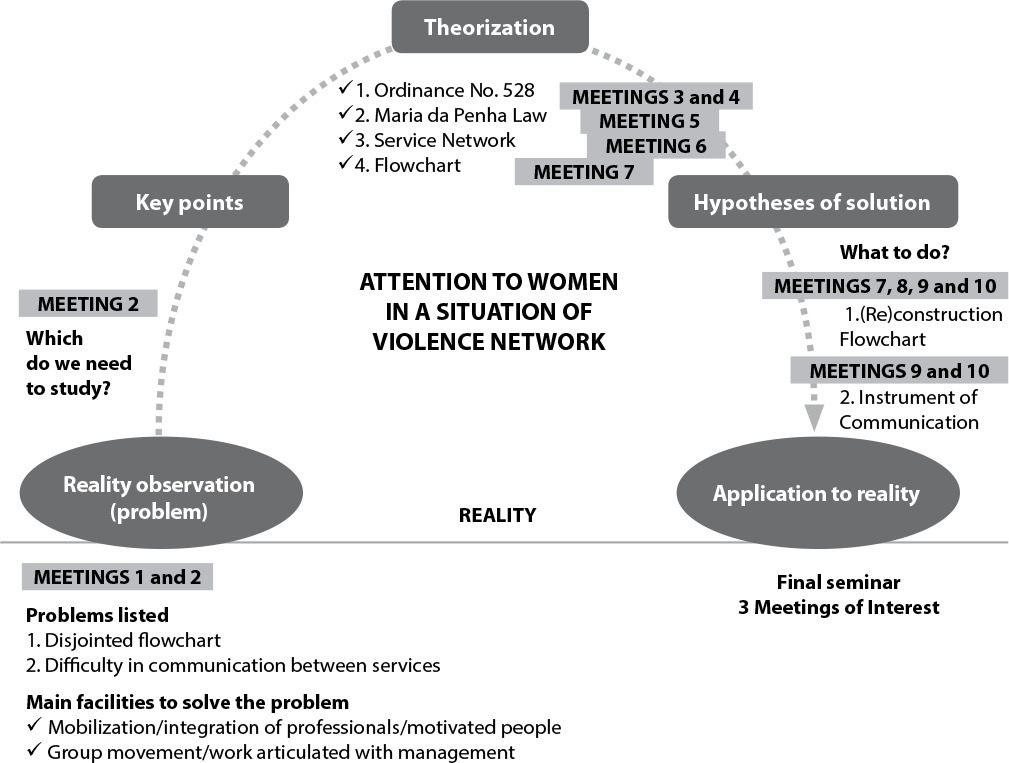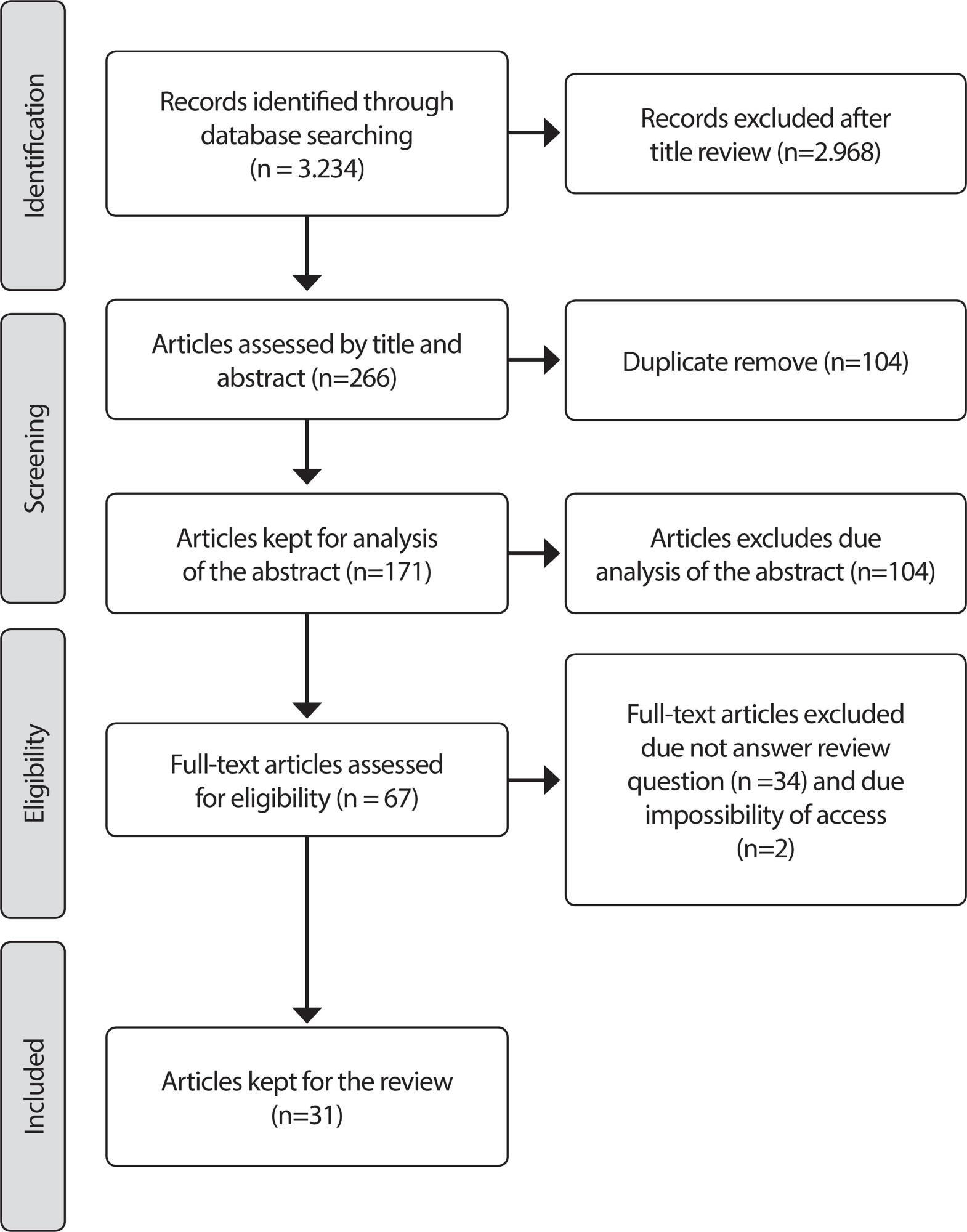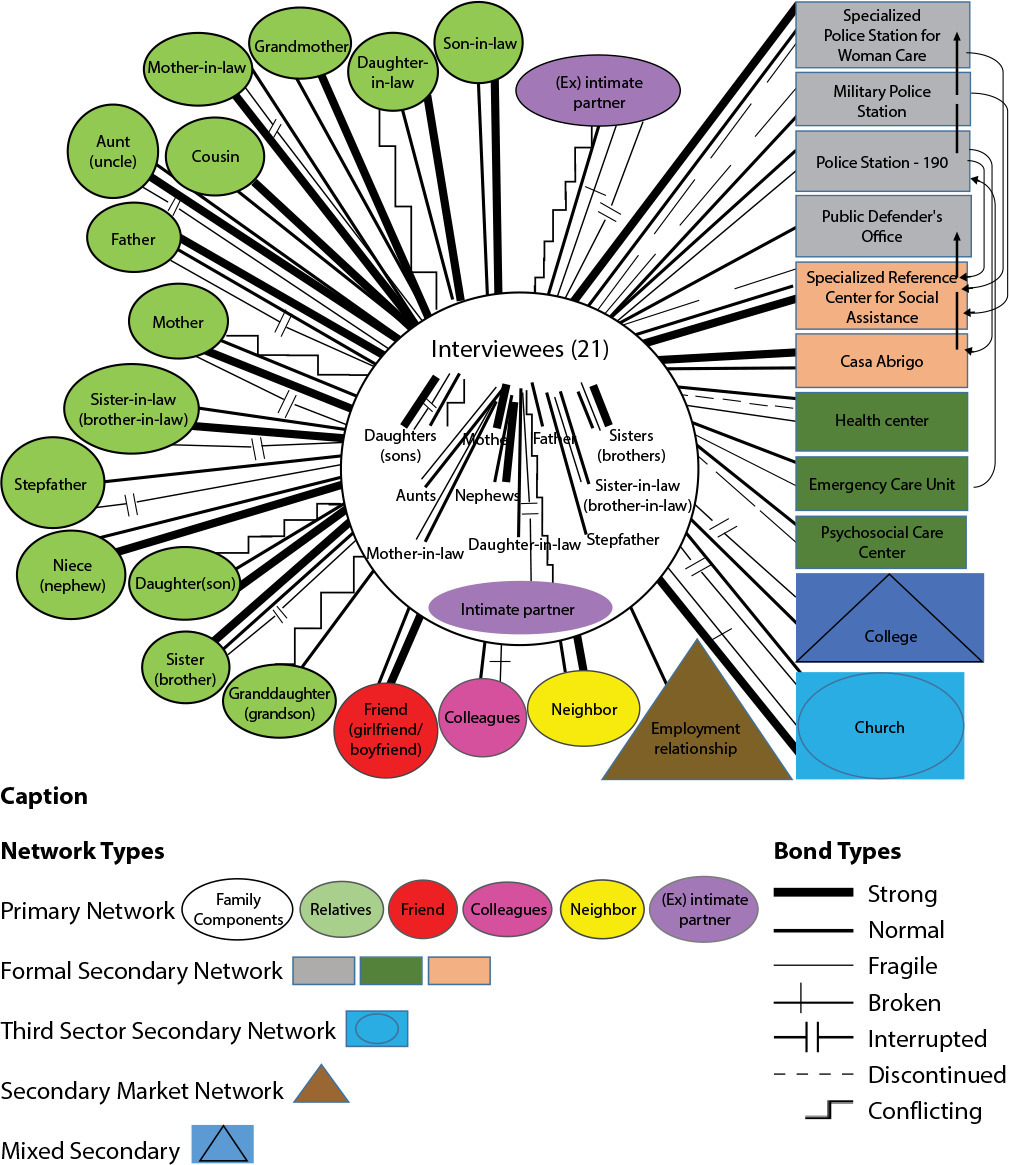-
ORIGINAL ARTICLE
Narratives of sex workers: intimate partner violence and coping strategies
Revista Brasileira de Enfermagem. 2024;77(6):e20240180
12-16-2024
Resumo
ORIGINAL ARTICLENarratives of sex workers: intimate partner violence and coping strategies
Revista Brasileira de Enfermagem. 2024;77(6):e20240180
12-16-2024DOI 10.1590/0034-7167-2024-0180
Visualizações0Ver maisABSTRACT
Objectives:
to understand the narratives of sex workers about violence suffered by intimate partners and their coping strategies.
Methods:
qualitative research, focused on thematic oral history, carried out with six sex workers in southern Brazil, who responded to in-depth interviews using a flexible script. Thematic content analysis was used.
Results:
the study included cisgender women who self-identified as half black and half white. Most had children and were separated. They reported abusive relationships by their intimate partners, with emphasis on verbal, psychological, financial, and physical violence and attempted femicide. Such violence resulted in coping strategies, such as avoiding emotional bonds and maintaining a discreet life.
Final Considerations:
intimate partner violence is prevalent among participants, leading them to adopt strategies to preserve their safety and well-being, highlighting the need for public policies that meet their particularities and guarantee protection.
-
ORIGINAL ARTICLE
Perception of men perpetrators of violence about paternity
Revista Brasileira de Enfermagem. 2022;75(4):e20210890
10-07-2022
Resumo
ORIGINAL ARTICLEPerception of men perpetrators of violence about paternity
Revista Brasileira de Enfermagem. 2022;75(4):e20210890
10-07-2022DOI 10.1590/0034-7167-2021-0890
Visualizações0Ver maisABSTRACT
Objectives:
to learn about the perception of men in the judicial process due to spousal violence about paternity.
Methods:
a descriptive, qualitative study with nine men in the judicial process due to spousal violence. Data were collected through interviews; the men validated the data, which were systematized by the categorical thematic content analysis, and analyzed in light of scientific texts that discuss the subject.
Results:
the study allowed the creation of three categories: the father is the example for the son; the father must provide for the son’s needs; the father corrects the son.
Conclusions:
that context reveals the need to re-signify paternity to influence children’s education positively.
-
ORIGINAL ARTICLE
Inter-sectorial network for assisting women in situations of violence: handicraft work built by the people
Revista Brasileira de Enfermagem. 2022;75(Suppl 2):e20210142
01-14-2022
Resumo
ORIGINAL ARTICLEInter-sectorial network for assisting women in situations of violence: handicraft work built by the people
Revista Brasileira de Enfermagem. 2022;75(Suppl 2):e20210142
01-14-2022DOI 10.1590/0034-7167-2021-0142
Visualizações0ABSTRACT
Objectives:
to discuss the meanings attributed by professionals to the construction of the service network for women in situations of violence.
Methods:
Convergent Care Research developed with the application of a convergence group with 32 participants from the health, social assistance, or public security sectors, in Santa Maria, Rio Grande do Sul. The data was produced during ten meetings, based on the problematization methodology, and submitted to analysis of thematic content and interpreted with the referential of networks.
Results:
the construction of the network is an artisanal work carried out by people continuously, permeated by bonds, communication and partnerships between services and knowledge of work processes. Lashings require permanent movement.
Final Considerations:
building a network implies defining intertwining lines; form nodes that create cross-sector connections. There is a need to institutionalize processes through care continuity protocols, associated with an efficient communication system between sectors.
Palavras-chave: Comprehensive Health CareGender-Based ViolenceIntersectoral CollaborationIntimate Partner ViolenceNursingVer mais
-
REVISÃO
Community interventions related to intimate partner violence among adolescents: scope review
Revista Brasileira de Enfermagem. 2019;72(1):277-286
01-01-2019
Resumo
REVISÃOCommunity interventions related to intimate partner violence among adolescents: scope review
Revista Brasileira de Enfermagem. 2019;72(1):277-286
01-01-2019DOI 10.1590/0034-7167-2018-0586
Visualizações0Ver maisABSTRACT
Objective:
To map the successful experiences of interventions aimed at coping with violence among intimate partners in adolescence, in the light of the gender and generation categories.
Method:
Scope review carried out in the MEDLINE, CINAHL, Scopus and PsycINFO databases. We selected primary, empirical, quantitative and qualitative studies published in three languages.
Results:
From the 3,234 articles found, 31 made up the review. Most of the interventions were carried out at the school level, with focus of interest in developing skills to maintain healthy relationships; types of violence; knowledge of non-violent alternatives to conflict resolution; resources to assist those involved; and role of friends as interveners.
Final Considerations:
Interventions to confront this phenomenon can modify the affective and sexual relationships in adolescence. In addition to the generation category, the actions should incorporate the gender perspective, related to the processes of construction of femininity and masculinity.

-
RESEARCH
Naturalization, reciprocity and marks of marital violence: male defendants’ perceptions
Revista Brasileira de Enfermagem. 2018;71(1):178-184
01-01-2018
Resumo
RESEARCHNaturalization, reciprocity and marks of marital violence: male defendants’ perceptions
Revista Brasileira de Enfermagem. 2018;71(1):178-184
01-01-2018DOI 10.1590/0034-7167-2016-0475
Visualizações0Ver maisABSTRACT
Objective:
to analyze male criminals' perception about marital violence.
Method:
An exploratory, descriptive, qualitative study undertaken with 23 men who were criminally prosecuted for marital violence. A multimethod data collection was conducted, with individual interview and focal group techniques combined, between May and December 2015. The data collected were initially categorized using the NVIVO® 11 software program, and then organized using the Collective Subject Discourse method.
Results:
the collective discourses reveal that, in the male's perception, conjugal violence is inherent in a marital relationships: it is a private, reciprocal problem that leaves body marks.
Conclusion:
gender dissymmetry as a social construct is evidenced, signaling the need to create spaces for reflection and re-signification of men and women, from a gender perspective.
-
RESEARCH
Intimate partner violence among postpartum women: associated factors
Revista Brasileira de Enfermagem. 2018;71(suppl 3):1306-1312
01-01-2018
Resumo
RESEARCHIntimate partner violence among postpartum women: associated factors
Revista Brasileira de Enfermagem. 2018;71(suppl 3):1306-1312
01-01-2018DOI 10.1590/0034-7167-2016-0643
Visualizações0ABSTRACT
Objective:
To identify the profile and assess the self-esteem of postpartum women, to characterize their babies and partners, and to verify the association of these characteristics with the occurrence of intimate partner violence (IPV).
Method:
Cross-sectional study with 207 postpartum women assisted in a public clinic.
Results:
There was no statistic correlation among the sociodemographic variables, personal and obstetric characteristics with the occurrence of IPV. The postpartum women who showed low self-esteem presented a higher exposure risk to IPV (p<0.01; OR=2.01 and CI 95% [1.40-2.87]). The mothers of the babies that were born with low weight (less than 2,500 g) had almost twice the chances of suffering violence (p<0.05; OR=1.74 and CI 95% [1.00-3.03]). The women whose partners did not consume alcohol presented a lower probability to be exposed to IPV (p<0.05; OR=0.182 and CI 95% [0.03-0.93]).
Conclusion:
Women's low self-esteem, babies' inappropriate weight and consumption of alcohol by partners were correlated to the occurrence of IPV.
Palavras-chave: Domestic ViolenceIntimate Partner ViolenceObstetric NursingPostpartum PeriodPregnancyViolence Against WomenVer mais




